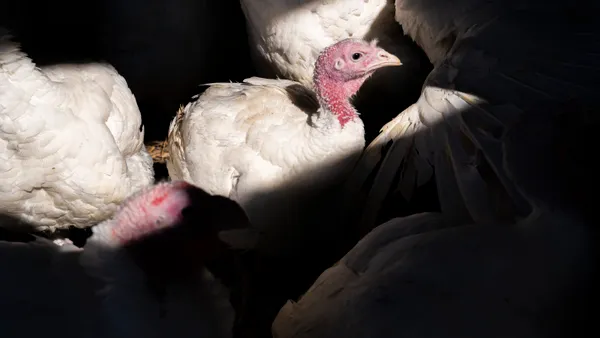Dive Brief:
- The Food and Drug Administration will lead the regulatory process to bring gene-edited meat to market, the agency announced last week, ending a yearslong turf battle with the Agriculture Department.
- The FDA will steer the review process in consultation with the USDA under an agreement signed between the two organizations. Depending on the animal, the Agriculture Department will help determine potential impacts to livestock health and food safety, among other things.
- The FDA also released updated draft guidance outlining requirements and recommendations for developers of genetically modified meat. The agency is requesting feedback before July 31.
Dive Insight:
Gene editing stands to revolutionize the meat industry, developers say, and has the potential to help animals better adapt to disease and climate change while improving their nutritious attributes. The question of who approves these products to enter the food supply, however, has remained politically fraught for years.
The USDA staked a claim to the title of lead regulator in 2020 following a Trump administration executive order to speed the review process for agriculture biotechnology products. At the time, former Agriculture Secretary Sonny Perdue proposed transitioning portions of FDA’s pre-existing animal biotechnology regulatory oversight to the USDA.
Scientists say there's no question that the FDA should be the one to take up the gauntlet of lead regulator. The agency has already used its existing authority to allow AquAdvantage salmon, which are gene-edited to grow with 25% less feed, to enter the market in a process that took approximately 20 years.
Additionally, the FDA has the mandate to protect human and animal health, while the USDA "does not have the same kind of overriding public health mission," said Dr. Peter G. Lurie, president of the Center for Science in the Public Interest.
The FDA has begun ramping up the approval process for gene-edited meat in recent years. The agency ruled in 2022 that there were little to no safety risks involved with Acceligen's beef cattle, which are genetically modified to grow shorter hair and better withstand higher temperatures.
Washington State University also received FDA approval last year for German-style sausages made from pigs with genetically modified traits meant to improve welfare and production efficiency.
"These technologies hold great promise for many uses and public and animal health benefits, such as animal disease resistance, control of zoonotic disease transmission, improved animal husbandry, and increased food production and quality," Tracey Forfa, director of the FDA's Center for Veterinary Medicine, said in a statement. "We as an agency need to keep our regulatory approach current with the evolution of the science.”











